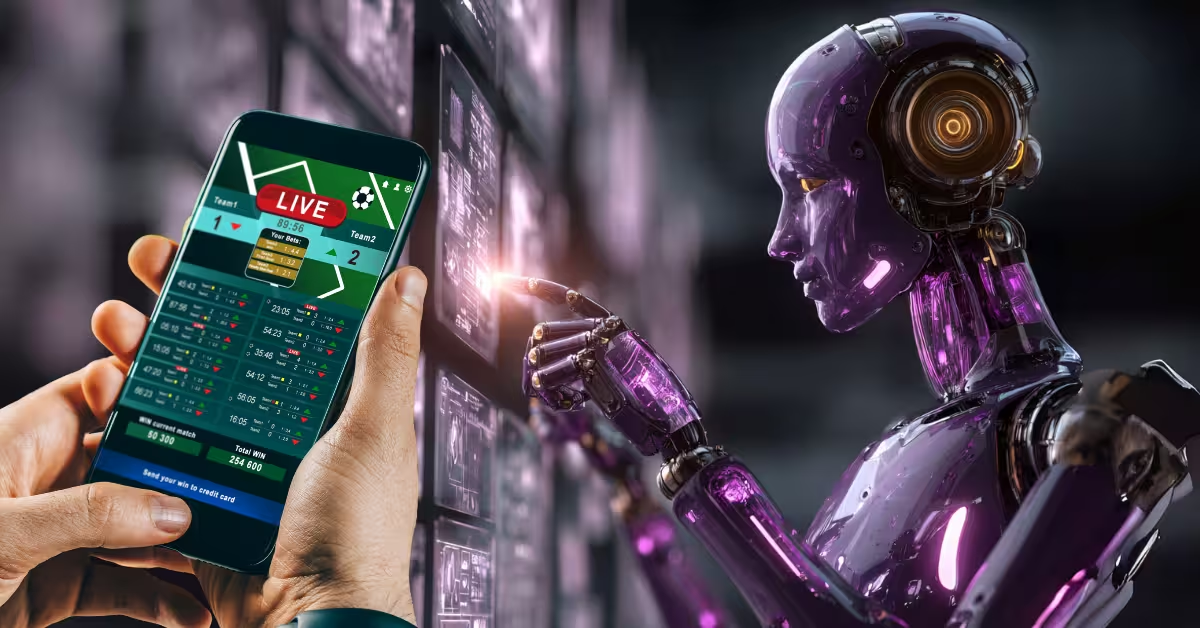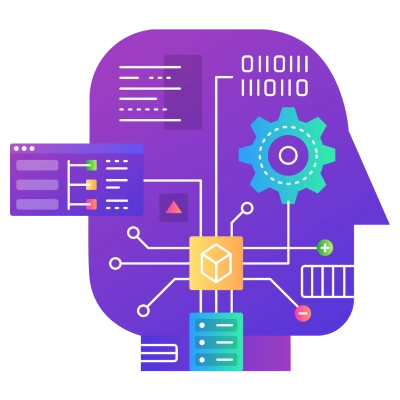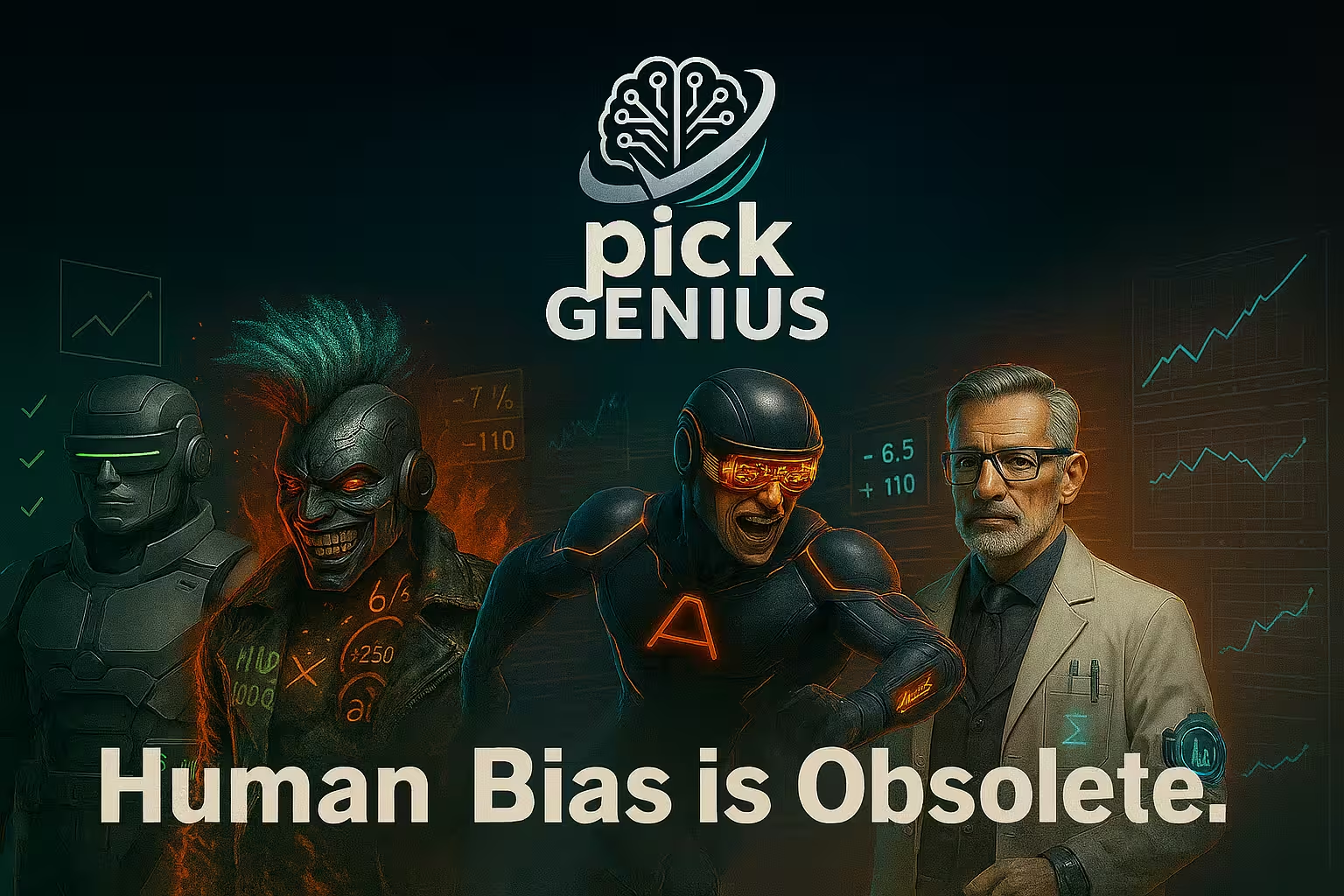The Rise of AI-Generated Sports Picks: Should Bettors Trust Them?

AI has worked its way into pretty much every industry out there. For the terminally online among us, every day there is some new AI platform or assistant that’s making its debut into the market.
There are the supposed self-driving cars from Tesla (no thanks, I’ll drive myself) to code-writing assistants and everything in between.
One of those in-between areas is sports betting, and that makes perfect sense. Americans are expected to wager around $30 billion on the NFL this season alone, so of course, bettors are looking for any kind of advantage they can get!
What’s the latest on this front? Say hello to AI-generated sports picks! They’re the betting recommendations that are made by algorithms and can crunch heaps of data to predict game outcomes.
But can an algorithm robot outwit your gut instinct or the most experienced vet bettors? That’s the debate, and a lot of people are super skeptical. Sports are played by humans, not robots, and we’ve all seen the upsets that “shouldn’t” have happened.
We’re entering the debate; should bettors trust AI-generated picks? And if so, why? Let’s take a scenic drive (not in a self-driving Tesla) and see how AI is changing sports betting and if it can actually give you an edge. Although we remain cautiously optimistic, there are others who swear by it. The jury is still out for now, but we’ll return a verdict by the end!
What Are AI-Generated Sports Picks?
What if you could have an assistant who can watch every game, read every injury report, and analyze decades of stats in seconds? And they don’t need to be paid, eat, or sleep.
That’s what AI-generated sports can do. The systems use machine learning algorithms and predictive modeling to analyze massive amounts of info; everything from player stats and team matchups to weather forecasts and social media chatter about a game.
Because it’s able to process data from live games, historical records, news articles, and all available sources, AI can identify patterns and correlations that would be impossible for a human to catch on their own. The end result is a data-driven prediction, like which team is most likely to win and by how much, or if a game will go over or under the point total.

How is this any different from the picks you’d get from a human handicapper? The main distinction is scale and speed. A human will concentrate on a handful of main stats or recent performances when they’re making a pick. But an advanced AI can digest and parse thousands of data points in seconds. It can give you a quarterback’s performance in the rain over the last 5 years, the team’s travel schedule, a last-minute injury update, and more subtle factors like a change in betting odds, and it can do so instantaneously.
AI models update their predictions in milliseconds when new info is available, like if a star player is ruled out just before game time. And humans just can’t compete or match that kind of reaction time.
That’s why so many bettors are giving AI picks a go; they get accuracy and the depth of insight in seconds. Instead of relying solely on gut feelings or one or two stats from last week’s game, you get recs that are grounded in hard data. Bettors are finding that AI-generated picks can show them hidden insights, like maybe an underrated team that’s ripe for an upset or a point spread that looks off based on historical trends.
Don’t panic! AI isn’t here to replace the excitement of sports because upsets will always happen, but it can stack the odds a little more in your favor by making better sense of all that data.
Why Bettors Are Hesitant to Trust AI
If the benefits of AI picks are so great, why isn’t everyone on the train? To answer that, we need to address the robot in the room: its trust. Bettors have a lot of reasons to be wary of handing decisions over to an algorithm. Next up, we are gonna tackle the most common concerns that we’ve heard and why they’re not as scary as they sound!
The Most Common Concerns
“AI can’t account for human factors like injuries, locker room chemistry, or motivation.”
Sports aren’t played on spreadsheets, and skeptics argue that an algorithm can miss the intangibles. It’s a fact that early AI models struggled with factors that are hard to quantify. A locker room feud, a player’s personal motivation, or a sudden change in team morale can indeed change a game, and numbers don’t always capture that.
Emotions and situational awareness are important in sports betting, and no algorithm can totally replicate that human context.
A human will hear a rumor about a star player who is nursing a secret injury or notice a team’s body language on the sideline, and these are cues an AI won’t see. But modern AI is trying to bridge this gap by incorporating more contextual data. Advanced systems today ingest information like injury reports and social media sentiment to gauge the less-tangible aspects of a matchup. They’re not perfect (no model will ever predict sports with 100% accuracy; last-minute surprises like freak injuries or bad referee calls will always be a thing), but they’re getting better at accounting for factors past box scores.
“Algorithms feel like a black box – how do I know it’s not random?”
This concern is all about transparency, as most AI platforms don’t explain how they arrive at a pick; they just spit out a team name or a percentage chance.
For a lot of bettors, that’s really unsettling. If you’re used to reading analysis from your favorite human handicapper (“Team X should win because their defense matches up well…”), then an unexplained AI pick feels like a random guess. And most AI systems do operate as black boxes: they give you a prediction without a reason why.
Understandably, bettors struggle to trust tips when they can’t see the reasoning, and it certainly doesn’t help that “AI” has become so popular; some sites will just slap the label on simplistic models without proving their accuracy. The good news? The best AI pick services recognize this and are becoming more transparent. Some give confidence ratings, back-test results, or point out key factors behind a pick.
Look, people don’t need a whole math lecture, but they should at least know how predictions are made! Users should demand AI tools that show their work (at least a little). A reputable system will happily share its track record and the main stats that influence a pick.
“Isn’t sports betting supposed to be about gut instinct and having fun?”
We do love us a good gut pick, don’t we? A lot of bettors, particularly in the US, where sports betting culture glorifies the fearless underdog call, rely on an algorithm that feels like you’re cheating or away from the fun of it.
There’s a sentimental notion that part of the thrill is trusting your instincts or the advice of that one TV pundit you like. And let’s be honest, it is so satisfying to nail a pick because you had a hunch. Using AI doesn’t have to kill that fun!
AI is just another source of insight, like reading expert analyses or injury reports. You still get to decide if you should follow it or go with your gut. A majority of bettors use AI picks as a starting point and then add their own knowledge on top.
And we all know that our gut instincts can lead us astray; as humans, we’re prone to bias and emotions (how many times has your “sure thing” pick lost because you were swayed by fandom or hype?). AI has no such emotional bias; it won’t favor a team because of nostalgia or media narratives. It’s more than okay to value your intuition, but there’s no harm in getting a second opinion from a super-informed “robot friend.” Skepticism of new tech is totally natural, but the AI systems of today have evolved in ways that address most of the above concerns.
The hesitations above are all valid; you should always approach betting tools with a critical eye. But dismissing AI outright could mean that you are missing out on a useful advantage. Modern AI pick systems are way more advanced than the crude algorithms of five years ago. They incorporate real-time news (so yes, they’ll know about that star player’s injury), they’re being designed with more transparency, and some use a hybrid approach (AI suggestions with human expert oversight).
The best ones are working to combine data-driven precision with the kind of context that we value. It’s not an either/or: you can have both analytics and intuition!
The Advantages of AI Picks Over Traditional Handicapping
Now that we’ve gotten the doubts out of the way, let’s talk about the upsides. Why should you use AI for sports picks? A well-designed AI can do things that no human handicapper could; at least not at the same scale or consistency. Next up, we get into the advantages of AI-generated picks over the traditional approach!
Data Depth
AI doesn’t just look at a few stats, no way. It rabbit-holes into data. A human might consider recent performances and a couple of matchup metrics. Meanwhile, an AI can analyze everything from long-term player performance trends and injury history to venue effects (travel distance, altitude, you name it). It can even scan referee tendencies and social media sentiment if those have predictive value. This breadth of analysis means AI can uncover hidden patterns. For example, it might spot that a basketball team performs 10% worse in back-to-back road games, combined with certain referees who call more fouls on them, factors a person could easily miss. By combing through such extensive data, AI systems often identify long-term trends and statistical anomalies that lead to value bets human experts overlook. In other words, it can flag those underdog picks or prop bets where the stats quietly favor an outcome that public opinion or basic analyses don’t see coming.
Unbiased
Emotions and biases can cloud even the sharpest human bettor. (We all have that one team we want to win or a bias towards offense over defense, etc.) AI has no favorite team, no “hot hand” fallacy, no tilt from a bad beat. It applies the same logic consistently, regardless of yesterday’s results or external hype. This lack of emotional bias is huge. If you’ve lost a few bets in a row, you might start second-guessing yourself or chasing losses with risky picks, which is classic human behavior. An AI won’t do that; it will keep making objective calls based on data. As one article noted, AI models operate without the sway of emotions; they stick to the data even after a losing streak. By removing ego and frustration from the equation, AI picks are less likely to make the kind of impulsive, irrational calls that humans sometimes do. The result is a more level-headed betting strategy, game after game.
Consistency
Related to bias, consistency means doing the same thorough analysis every time. Human handicappers have good days and bad days. They get tired, they overlook things, or they might slack on research for a less popular game. AI doesn’t get bored or fatigued – it will rigorously analyze Monday night’s game between last-place teams with the same diligence as the Super Bowl. And AI never takes a day off. During a busy Saturday of college basketball, an algorithm can crunch numbers on dozens of games in parallel, whereas a person would be overwhelmed. This systematic approach can translate into more reliable picks. You won’t get the wild swings of quality that you might from a human capper who’s on a cold streak or just guessing on a sport they know less about. Moreover, AI can simultaneously cover multiple leagues and sports without any drop in quality. As noted earlier, one person might specialize in, say, the NFL or NBA, but an AI can handle the NFL, NBA, MLB, college sports, you name it, all at once. It’s like having a team of expert analysts for every sport, rolled into one program.
Adaptability
One of the coolest advantages of AI picks is how quickly they adapt to new information. Betting lines move, star players get injured in warm-ups, and weather forecasts change; all these things can affect a game’s outcome. A human handicapper might not catch a lineup change 5 minutes before tip-off, or might not know how to recalculate their prediction STAT. AI can. Modern AI systems update their predictions in real time as data changes. If a key quarterback tweaks an ankle during practice, an AI model can instantly adjust the team’s win probability and even the recommended bet, often faster than the sportsbooks can move the odds. This adaptability extends to in-game betting too: algorithms monitor games live and can react within seconds to events (a red card in soccer, a foul-out in basketball) that might alter the bet landscape. In fact, some sportsbooks themselves use AI to adjust odds and spot mispriced lines within milliseconds dynamically. For bettors using AI picks, this means you’re getting the most up-to-date insights possible. The AI won’t forget to factor in that it started snowing at the stadium or that the opposing coach announced a surprise starting lineup. Those updates get baked into the prediction immediately.
Finding Hidden Edges
The cherry on top of the advantages is the kind of insights AI can surface that traditional methods will miss, and this is where AI complements human handicapping. An AI can detect a subtle betting trend, like the public is regularly overvaluing a popular team after a loss, which causes the lines to be skewed in the next game.
During a season, that can be a small but exploitable edge, and it’s the kind of pattern a sharp bettor would love to know. AI is exceptional at detecting the “hidden” statistical edges that are buried in the data. It can also simulate outcomes thousands of times (Monte Carlo simulations) to understand probabilities better than a gut check ever could. All of this translates to more accurate and nuanced predictions. Studies have found that AI-driven models, by continuously learning and back-testing against results, usually pinpoint undervalued odds that casual bettors or pros miss. And in betting, finding those few percentage points of edge is the name of the game, and that’s exactly what AI is built to do.
Why Not All AI Picks Are the Same
Just because something says it’s AI doesn’t mean that it’s a sophisticated or reliable tool. The sports betting world is seeing a deluge of new AI-based services, and some are cutting-edge, but others? Eh, not so much.
Beware the Buzzword
“AI” has become the hottest marketing term on earth. Some so-called AI pick services out there are just simple algorithms or glorified spreadsheet models. A site might advertise AI picks, but under the hoo,d it’s doing nothing much except for pulling team stats and recent scores and spitting out a pick with the bare minimum of analysis. That’s a far cry from the machine learning and predictive modeling that genuine AI platforms use.

Early sports algorithms were pretty rudimentary: they looked at things like win-loss records and scoring averages and not much else. By contrast, the latest AI models use deep learning and combine dozens of factors in real time. When you’re evaluating an AI pick service, you should ask, What’s actually going on under the hood? If the provider can’t answer or isn’t transparent about their approach, be super cautious. The best AI systems all use ensemble models (combining multiple algorithms) to improve accuracy. That level of sophistication is a good sign; a one-trick pony model that some random person threw together is not.
Risks of Unproven Systems
Just as you wouldn’t trust a random guy on Reddit with your life savings based on his “locks of the week,” you shouldn’t put your faith in an unproven AI system. If a platform is new or hasn’t published results, be super wary.
- One risk is overfitting; a model might look great in back-testing but perform poorly in the real world because it was “curve-fitting” past data.
- Another risk is outdated data; an AI is only as good as what it’s fed; if it’s not pulling the latest info (like if it doesn’t update for injuries or weather), its picks will be off.
A transparent track record is so important, so look for the AI services that share historical performance or at least give you some insight into how they’ve tested their model.
Reputable platforms all allow a trial period or publish their win percentages, so if someone claims a 90% win rate “thanks to AI,” you should head in the opposite direction, because that’s a scam. Even the best bettors or models in the world hit around 55-60% against the spread over the long term.
The Importance of Transparency
We talked about the “black box” issue earlier, and it ties in here. Trustworthy AI pick systems all give users transparency. It could mean explaining their methodology at a high level, or providing reasoning for individual picks (“Team A is favored due to X, Y, Z factors identified by the model”). Transparency not only helps you trust the picks more, but it also educates you as a bettor.
If a service just says, “Take the Eagles, our AI says so” with zero context, that’s a bright red flag. But if a service lets you see why the AI likes the Eagles and tells you that the opponent’s defense has a poor efficiency rating and their QB is on a downward trend, then you know it’s not a random pick.
Good AI platforms always acknowledge uncertainty (“We’re 65% confident in this pick”), and you should demand clarity. As a bettor, you have every right to know if an “AI pick” is coming from a strong machine learning model analyzing 10 years of data or from some dude’s Excel sheet.
Spotting Advanced vs. Basic AI
How can you tell an advanced AI betting model from a basic one if you’re not a tech nerd or a coder? There are some clues: Advanced models usually use varied data sources (team stats, player data, market odds, etc.), and they update frequently (maybe even live).
They use techniques like machine learning, neural networks, or Monte Carlo simulations. Simpler models rely on a handful of stats or static formulas (like always picking the team with the better record or point differential).
Another dead giveaway is if the platform adapts to new info; advanced systems will incorporate breaking news quickly and will send alerts like “Our model adjusted its pick after learning the starting goalie is out.” Basic ones might never change a pick once it’s given, even if major news breaks.
Transparency comes into play here again: if the creators are open about how it works, you can gauge its complexity. Case in point: a platform shared that they use ensemble learning (multiple algorithms voting on picks) to avoid biases of any single model, and that’s the kind of sophistication you want. If a service has nothing to say about its tech, assume it’s mediocre at best.
The bottom line is this: do your research before you use an AI pick service! There are some really fantastic tools out there that can genuinely help your betting, but there are also ones that are just trying to make a buck. Look for transparency, proven results, and evidence of advanced analytics. If you find those? You’ve likely found a legit AI pick system!
Enter PickGenius: A Smarter Way to Bet
And now for the big reveal: PickGenius! It’s GamblingSite.com’s proprietary AI-powered sports picks system. We’ve discussed AI’s potential and downsides, and PickGenius is our answer for bettors who want to harness that potential in a reliable, user-friendly way.
What is PickGenius? In a nutshell, it’s an advanced machine learning platform that analyzes a mind-boggling amount of sports data to deliver betting picks that are data-driven and insightful. But because we know that every AI service out there claims to be “advanced,” we are going to explain why PickGenius is different!

PickGenius isn’t some off-the-shelf algorithm. Nope! It uses the most sophisticated machine learning models that are trained on years of historical data.
We’ve fed it past game results, player performance metrics, betting line movements, you name it, stretching back more than a decade. The system is constantly learning from this data, so it’s in no way static; it evaluates what factors really matter in predicting outcomes by training on the wins and losses of thousands of games. This means over time it has identified patterns (some that would surprise even vet bettors) in how various inputs correlate with results. We utilize techniques like ensemble learning and neural networks to squeeze out as much predictive power as is humanly (or robotically) possible. PickGenius approaches the game from multiple angles, not just from one formula.
A big differentiator for PickGenius is the breadth of data that is processed. A lot of tools concentrate on team stats and recent trends, but PickGenius goes much deeper. It combines traditional metrics (team offense/defense rankings, player stats, etc.) with contextual and real-time data.
It incorporates injury reports and player availability in its calculations; if a star player is out, the model knows and adjusts accordingly. It looks at weather forecasts (yes, the weather can change a football game’s scoring). It keeps tabs on betting market movements, understanding how odds shifts can show sharp money or public bias. It also factors in the less obvious stuff: travel schedules, rest days, and live data feeds during games to adapt in real time.
The goal is to mirror how a human would think about all different angles, but to do it with machine precision. Because PickGenius synthesizes things like team matchups, player form, injuries, and betting sentiment all at once, you get a more complete picture. No single stat (like “points per game”) drives the prediction; it’s the combo that matters.
Sports are dynamic, so a good AI system has to be dynamic as well! PickGenius is always updating with live data. If a lineup change is announced an hour before tip-off, our system ingests that and recalculates the probabilities on the fly. If a game’s odds move because a lot of bets are coming in on one side, PickGenius weighs if that movement creates a value opportunity.
The picks it provides aren’t a one-and-done thing; they’re the latest view according to the data at that moment. Users of PickGenius get the benefit of these real-time adjustments, and this is huge for staying ahead of the market. If there’s breaking news on Sunday morning that a quarterback is out with the flu, PickGenius will flag that the underdog now has a much better shot, and possibly before the sportsbooks can fully adjust the line. You’re always betting with the most current info in hand, as processed by our AI.
We built PickGenius not just for data scientists or professional bettors, but for everyday sports fans and bettors who want to make smarter picks. That means we focus on making the output really easy to understand.
When PickGenius recommends a pick, we present the main reasons in plain language. You could see something like, “PickGenius likes the Chicago Bears +6.5. Key factors: forecasted heavy rain (benefits Bears’ run-heavy offense), opponent’s QB has 60% win rate in games under 50°F (Sunday will be 45°F), and Bears’ defense has improved on third downs in the last 3 games.”
By highlighting the above factors (which our model identified), we give you a window into the why behind the pick. The transparency helps users to trust the recommendation and also learn something new. It’s like having an expert analyst along with the AI. We really believe this combo of sophisticated analysis + clear explanation sets PickGenius apart from the rest of the AI pack.
We made PickGenius to help both recreational bettors and serious sharps make better decisions. If you’re a casual bettor, it takes most of the heavy lifting off your plate; you don’t have to spend hours researching every game, because the AI has done it for you.
And if you’re more of a hardcore bettor, PickGenius acts as a powerful second opinion or validation tool for your own analysis. Our system is really good at flagging games with hidden value, the situations where public perception and betting odds don’t line up with the underlying data.
If the public is all over Team A because they’re a popular franchise, making them a bigger favorite than they probably should be, then PickGenius would spotlight Team B (the underdog) as a value bet if the stats indicate that the game is closer to a toss-up than the odds suggest.
AI is excellent at identifying these undervalued odds, because it doesn’t care about team popularity or narrative; all it sees is that Team B’s chances are, say, 45% to win, but the odds imply only 30%. The edges are where the smart bettors make money, and that’s exactly what PickGenius was built to find for you!
How to Use AI Picks Wisely
If you’re using PickGenius or any other AI pick system, there is one golden rule: AI is a tool, not a seer that can predict the future. To get the most out of it, you need to use it in a smart way! Below are some best practices for integrating AI-generated picks into your betting strategy:
- Treat AI as an Advisor, Not a Guarantee: No matter how advanced, AI’s picks are predictions; they are never sure things. Upsets happen, and variance is part of betting. Use the AI’s advice as a knowledgeable second opinion. Think of it like consulting a really smart friend who has analyzed the games; you value their input, but the final call is yours. There is no model that can predict sports outcomes with 100% accuracy, and if someone claims otherwise, they’re lying.
- Combine AI Insights with Your Own Analysis: The best approach is a hybrid one. Take the AI pick and ask, “Does this make sense to me? Did I consider all these factors?” If PickGenius flags an underdog because of a matchup advantage you weren’t aware of, dig a little deeper into that. Likewise, consider things the AI might not fully account for. Check the latest local news; maybe a star player had a family tragedy and isn’t in the best mindset, or the team is rallying around a retiring coach. The human elements can be layered on top of the AI’s data-driven view. Let the AI narrow down the slate to a few promising games, and then apply your personal knowledge or intuition to pick the final bets. This way, you’re leveraging both machine precision and human context.
- Don’t Ignore Intangibles: If your gut is screaming at you that the AI doesn’t account for something, it’s fine to give it weight (within reason). Maybe you know that a team plays best as an underdog because you’ve followed them all your life, or you have insight into a locker room situation. The AI deals in probabilities, not certainties, so sometimes a low-probability outcome will hit. If you have a contrarian hunch, there’s no rule saying you have to always go with the AI. The combo of AI analytics and human intuition can be powerful when used correctly! Use the AI to cross-check your biases.
- Practice Bankroll Discipline: AI can help you make smarter picks, but it can’t manage your wallet or emotions. You have to practice good bankroll management principles regardless of who/what is making the pick. Set a unit size for bets (a fixed percentage of your bankroll) and don’t give in to the urge to “go all-in” because an AI pick feels strong. AI doesn’t remove all risk, so you should never treat an AI pick as a license to bet recklessly.
- Keep Records and Learn: Just like you track your own bets in a spreadsheet, do the same when using AI picks! Monitor how the AI is performing for you, like the overall win rate, where it excels, and where it falters. Use that knowledge to calibrate your strategy. Also, pay attention to the AI’s analysis provided (if using PickGenius or a tool that explains itself). You can learn a lot about what factors drive outcomes.
The Future of Sports Betting With AI
AI will play an even bigger role in sports betting in the coming years; we are at the early stages of this tech in the betting world. What could the next 5–10 years bring? Below are some predictions on the future of sports betting with AI!
AI Goes Mainstream
Using AI for picks might feel like it’s some kind of newfangled cutting-edge strategy (and it sort of is). But in a few years, it could become the standard. Just like advanced stats and analytics transformed how teams draft players or call plays, analytics via AI will eventually become a mainstream part of betting.
We anticipate that in the next decade, most serious bettors will either use AI tools or at least be influenced by AI-driven data. The barrier to entry is getting lower, as more user-friendly apps and services are emerging that package AI insights for regular users. It’s not far-fetched to say AI could become as common in a bettor’s toolkit as the point spread sheet or the injury report. And sportsbooks are likely to use AI more themselves (many already do in setting odds). By 2030? Experts predict we’ll see things like fully automated AI-generated betting portfolios and personalized AI betting advisors for individuals. The industry may evolve to where your betting app has an AI assistant built in to help tailor wagers to your preferences and goals.
Sportsbooks Using AI (Arms Race)
There’s a really interesting dynamic on the horizon: as bettors use AI to find advantages, sportsbooks will use AI to protect theirs. We’re already seeing this to some extent; books are employing algorithms to detect unusual betting patterns or to move lines quicker when sharp action hits. In the future, sportsbooks will leverage AI for setting more efficient lines, managing risk, and possibly predicting what customers will bet on.
An AI that can dynamically adjust odds in real time (far faster than human odds-makers) could make life a lot harder for bettors trying to find bad lines. Sportsbooks are looking at AI for tighter integration between their risk engines and public tips, and that means the gap between what bettors know and what books know could narrow. Does this mean the end of value bets? Not exactly. But it does mean that the game evolves. Bettors’ AI and Bookies’ AI may find themselves in a cat-and-mouse competition.
The good news for us bettors is that early adopters of AI (ahem, that’s us and why we made PickGenius) have an advantage before the rest of the market catches up. There’s a window where sportsbooks are still adjusting to this new landscape, and in that window? Smart bettors can profit.
Early Adopters Gain an Edge (For Now)
Think of any technology wave: those who used data-driven stock trading in the 90s usually profited before it became the norm. In sports betting, we’re at that juncture with AI. Right now, if you’re using a sophisticated AI system and most others aren’t, you have a potential edge in finding value that others miss.
And as AI becomes ubiquitous, that edge will shrink because lines will grow sharper (as both bettors and books use similar tools). But we’re not at full saturation yet. With AI, early adopter bettors can use the tech before it’s everywhere, which isn’t to suggest that AI will cease being useful once everyone has it; it will just become a baseline necessity to compete. The playing field will level out in the long term, but those who start now will be ahead of the curve and more experienced in using the tools by the time everyone else does.
Integration and Personalization
We foresee a future where AI doesn’t only give generic picks, but tailors itself to each bettor’s style. Love parlays? Your AI might devise an optimal parlay combo for you. Like live-betting? AI will specialize in monitoring games and nudging you when a live opportunity (like a favorable moment to bet on an underdog) pops up.
AI could become your very own betting coach. It might even help with self-regulation; an AI can warn you if you’re deviating from your usual strategy and chasing losses and urge you to take a break (it’s possible; AI can detect betting patterns and anomalies, which could be used for responsible gambling prompts).
On the industry side of things, we expect more AI-driven products like simulators that let you “ask” what-if questions, like “What are the odds Team X makes the playoffs if they win this week?” as AI can simulate seasons quickly. The convergence of AI with things like virtual reality and live streaming could make more interactive betting experiences.
Responsible Gambling and AI
Finally, a really important aspect of the future is using AI to promote healthier betting. It’s not always a bettor’s first concern when thinking about picks, but it should be!
AI can identify patterns that suggest a bettor is in trouble (like rapidly increasing bet sizes after losses), and platforms can use that to intervene or provide resources to help. The hope is that AI will also be a tool for making betting more sustainable and less predatory. On our end, we programmed PickGenius with the principle that it’s about making smarter bets, not just more bets. The future we envision is one where bettors are more informed, more disciplined, and treat betting as the strategic activity that it is, with AI as an assistant, not a temptor towards risky behavior.
PickGenius: The Future of Winning Starts Now
AI is incredibly powerful for crunching all of those numbers and pointing out value, but you, the bettor, are the one who is managing risk and making the final call!
The best outcomes usually come from a collab: AI does the heavy analytical lifting, and you apply your own judgment and control. We built PickGenius with this philosophy in mind; it’s an aid, not a replacement for the bettor. And when you combine your sports knowledge with AI’s number-crunching, you’re stacking the deck in favor of smarter bets and a more sustainable betting approach!
Here’s a quick recap of everything that we covered:
- AI picks aren’t going anywhere; they are now a part of modern betting strategy.
- Skepticism is smart, but advanced tools like PickGenius separate themselves from the surface-level “stat bots.”
- When used correctly, AI adds more stability. It helps you avoid knee-jerk bets and think in probabilities instead of impulses.
- GamblingSite.com’s PickGenius puts that into practice; it’s a combo of machine learning and clear, usable insights for bettors!
Wanna kick the tires? You can give PickGenius a test drive if you’re curious, because the easiest way to judge AI picks is to test them alongside your own process! Line up your slate, compare where you and PickGenius agree or diverge, and see what the results look like over a week or two. The tech is already altering the betting landscape, and trying it out is the best way to decide if it deserves a place in your betting strategy!

Alyssa contributes sportsbook/online casino reviews, but she also stays on top of any industry news, precisely that of the sports betting market. She’s been an avid sports bettor for many years and has experienced success in growing her bankroll by striking when the iron was hot. In particular, she loves betting on football and basketball at the professional and college levels.








